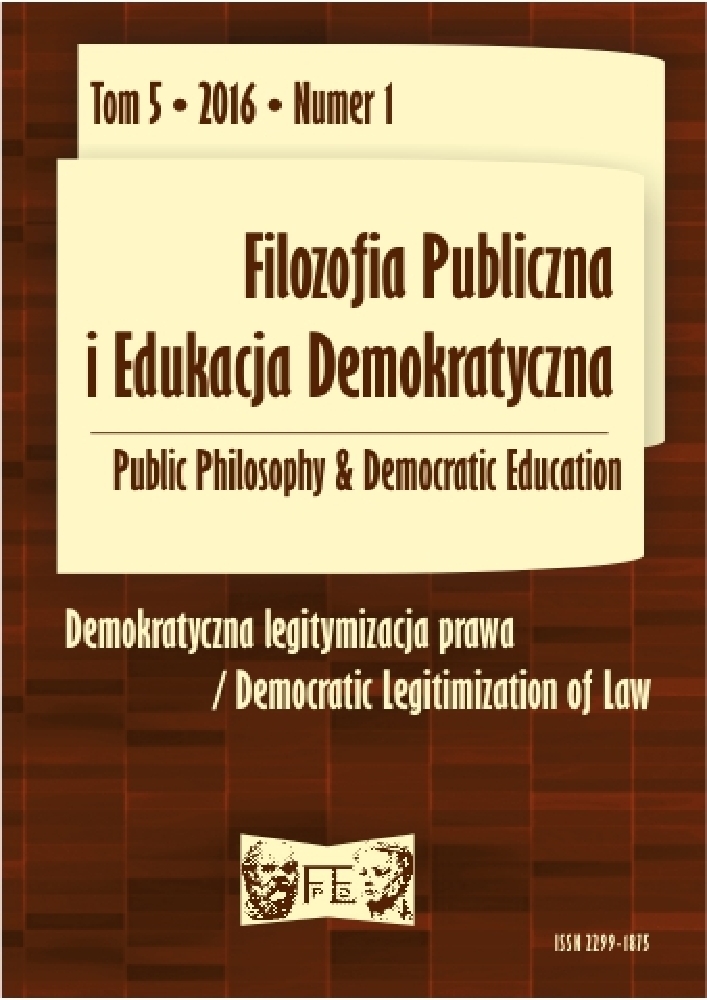Abstract
This article attempts to answer the question why is it worth to exhibit the category of agency in the legal practice. Answering the question I started my discussion from the presentation ideas related to the issue of the social role of the lawyers. In the completion of this objective, I discussed three ideas: moral responsibility, trust and subjective agency. Putting forward the role of the lawyer, I paid attention to the relationship between the notion of trust in the lawyer’s role and moral responsibility. This relationship is based on an ethical link, which is founded on a kind of obligation. This idea can be demonstrated by looking into confidence in the lawyer’s role as a special form of obligation to consider individual, institutional and social arguments. In the presented approach the state of limbo between the individual dimension, which focuses on the relationship between a specific individual and their rights, and the public dimension, where attention is paid to institutional and social arguments, is a characteristic feature of the professional role of a lawyer. The shaping of a professional role in a subjective and structural authorship is based on the idea of a two-way movement. It consists in highlighting the institutional structure with simultaneous reinforcement of the role of the subject who acts within it.
References
Arendt Hannah, „Kilka zagadnień filozofii moralnej”, w: Jerome Kohn (red.), Odpowiedzialność i władza sądzenia, tłum. Wojciech Madej, Mieczysław Godyń, Wydawnictwo Prószyński i S-ka, Warszawa 2003 (ss. 80-175).
Arendt Hannah, Myślenie, tłum. Hanna Buczyńska-Garewicz, Czytelnik, Warszawa 2002.
Arendt Hannah, Wola, tłum. Robert Piłat, Czytelnik, Warszawa 1996.
Bauman Zygmunt, Kultura jako praxis, tłum. Jacek Konieczny, PWN, Warszawa 2012.
Beck Ulrich, Społeczeństwo ryzyka. W drodze do innej nowoczesności, tłum. Stanisław Cieśla, Wydawnictwo Naukowe Scholar, Warszawa 2004.
Bovens Mark, The Quest for Responsibility. Accountability and Citizenship in Complex Organisations, Cambridge University Press 1998.
Butler Judith, Giving an Account of Oneself, New York, Fordham University Press 2005.
Cane Peter, Responsibility in Law and Morality, Hart Publishing, Oxford-Portland Oregon 2002.
Cover Robert, „Violence and the Word”, The Yale Law School 1986, vol. 95 (ss. 1601-1629).
Czapska Janina, „Konflikty związane z pełnieniem roli prawnika-uczestnika wymiaru sprawiedliwości”, w: Grażyna Skąpska, Janina Czapska, Maria Kozłowska, Społeczne role prawników (sędziów, prokuratorów, adwokatów), Ossolineum, Wrocław-Warszawa- raków-Gdańsk-Łódź 1989 (ss. 29-54).
Dynarowicz Ewa, „Komisja Prawdy i Pojednania w kulturowym repertuarze nowej RPA: Południowoafrykański dramat po apartheidzie (1996-2002)”, w: Renata Diaz-Szmidt, Małgorzata Szupejko (red.), Kalejdoskop Afrykański. Problematyka tożsamości w literaturach Afryki przełomu XX-XXI wieku, Wydawnictwo Aspra, Warszawa 2012 (ss. 205-220).
Filek Jacek, Ontologizacja odpowiedzialności. Analityczne i historyczne wprowadzenie w problematykę, Wydawnictwo Baran i Suszczyński, Kraków 1996.
Fromm Erich, Rewolucja nadziei. Ku uczłowieczonej technologii, tłum. Halina Adamska, Wydawnictwo Rebis, Poznań 1996.
Giddens Anthony, Konsekwencje nowoczesności, tłum. Ewa Klekot, Wydawnictwo Uniwersytetu Jagiellońskiego, Kraków 2008.
Giddens Anthony, Nowoczesność i tożsamość. „Ja” i społeczeństwo w epoce późnej nowoczesności, tłum. Alina Szulżycka, PWN, Warszawa 2010.
Gordon Robert W., „Why Lawyers Can’t Just Be Hired Guns”, w: Deborah L. Rhode (ed.), Ethics in Practice: Lawyers’ Roles, Responsibilities, and Regulation, Oxford University Press, Oxford – New York 2000 (ss. 42-55).
Hart Herbert Lionel Adolphus, Punishment and Responsibility. Essays in the Philosophy of Law, Clarendon Press, Oxford 1968.
Kaczmarek Przemysław, „Zaufanie do zawodów prawniczych w społeczeństwie ryzyka”, w: Hubert Izdebski, Paweł Skuczyński
(red.), Etyka prawnicza. Stanowiska i perspektywy 2, LexisNexis, Warszawa 2011 (ss. 11-20).
Kozak Artur, Granice prawniczej władzy dyskrecjonalnej, Kolonia Limited, Wrocław 2002.
Kronman Anthony T., „The Law as a Profession”, w: Deborah L. Rhode (ed.), Ethics in Practice: Lawyers’ Roles, Responsibilities
and Regulation, Oxford University Press, Oxford – New York 2000 (ss. 29-41).
Kruse Katherine R., „The Jurisprudential Turn in Legal Ethics”, Arizona Law Review 2011, vol. 53 (ss. 493-531).
Lacey Nicola, „Responsibility and modernity in criminal law”, Journal of Political Philosophy 2001, 9 (3) (ss. 249-276).
Lindroos-Hovinheimo Susanna, Justice and the Ethics of Legal Interpretation, Routledge 2 Park Squarte 2012.
Matczak Marcin, Summa Iniuria. O błędzie formalizmu w stosowaniu prawa, Wydawnictwo Naukowe Scholar, Warszawa 2007.
May Larry, The Socially Responsive Self. Social Theory and Professional Ethisc, The University of Chicago Press, Chicago/London 1996.
Skuczyński Paweł, Status etyki prawniczej, LexisNexis, Warszawa 2010.
Spyra Tomasz, Granice wykładni prawa. Znaczenie językowe tekstu prawnego jako granica wykładni, Zakamycze, Kraków 2006.
Sztompka Piotr, Kapitał społeczny. Teoria przestrzeni międzyludzkiej, Znak, Kraków 2016.
Sztompka Piotr, Socjologia. Analiza społeczeństwa, Znak, Kraków 2012.
Sztompka Piotr, „Teoria stawania się społeczeństwa. Szkic koncepcji”, Kultura i Społeczeństwo, 1991 (1) (ss. 17-26).
Sztompka Piotr, Zaufanie. Fundament społeczeństwa, Znak, Kraków 2007.
Śpiewak Piotr, „Dobro wspólne w myśli politycznej Hannah Arendt”, w: idem (red.),W stronę wspólnego dobra, Aletheia, Warszawa 1998 (ss. 129-182).
Veitch Scott, Law and Irresponsibility: On the Legitimation of Human Suffering, Routledge Cavendish 2007.
License
Copyright (c) Authors retain copyright and publishing rights to their articles in this journal, granting the journal the right to distribute them under the terms of the CC BY-NC-ND 4.0
